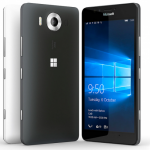Facebook encourages conversation with Messenger Links and QR-like Messenger Codes

WhatsApp may have a billion users, but Facebook Messenger isn't far behind: Mark Zuckerberg says "900 million people now use Messenger every month". Nowadays, Facebook is about much more than people sharing pictures of breakfast and bitching about their friends, it's also a valuable tool for businesses.
With this in mind, Facebook is adding a number of features to Facebook Messenger that it says will make it easier for businesses to connect and converse with their customers. Usernames will make it easier for people to identify businesses, while Messenger Links and Messenger Codes (just think QR codes with a fresh lick of paint) are being rolled out to make it quicker and easier to start conversations.
FBI briefs senator about how it cracked San Bernardino iPhone, but keeps Apple in the dark

It turned the case of the century in to the case that didn’t really happen. The battle between Apple and the FBI came to a sudden end last month when the US Justice Department said it didn’t need the iPhone manufacturer's help, and then successfully hacked its way into the iPhone in question.
With the San Bernardino shooter's iPhone seemingly successfully cracked, the FBI last night revealed to Senator Dianne Feinstein just how it managed it. There are no current plans to share this information with Apple, but FBI Director James Comey revealed that the tool that was brought in only works on the iPhone 5c.
Chuwi Hi12 -- a Surface Pro 4 and iPad Pro alternative at a fraction of the cost [Review]

The number of convertible tablets vying to take on Microsoft's Surface Pro 4 is on the increase. Some are more than reasonable competition while others are little more than cheap knock-offs. The absurdly low price of the Chuwi Hi12 might fool you into thinking that this 12-inch Chinese tablet falls into the latter camp, but you'd be wrong.
Costing an unbelievably low $289.99 (neatly below the promised $300 threshold), the Hi12 is not strictly a direct competitor to the Surface range... it lacks the all-important kickstand. So we're off to a great start with price, and the looks are certainly not to be sniffed at either; it's not a million miles away from iPad territory. But while looks and price are important, it's what's on the inside -- and how it works -- that matters, and the Hi12 does not disappoint.
Facebook boosts live video with new interactive options including Live Reactions and group video

Facebook Live may have started life as a celebrity-only feature, but it soon spread to all users, giving them the opportunity to share their own live video streams. Today the social network unveils a number of new features with the aim of making it easier to find and share live broadcasts, as well as personalizing and interacting with video.
Live video is all about bringing together a community of people to share an experience, so it's little surprise that the first of today's announcements sees the arrival of Facebook Live to Facebook Groups and Facebook Events. Building on the Reactions feature that rolled out recently, live video now also benefits from Live Reactions. But the laundry list of new features doesn't end there.
Chinese censors spring into action to erase mentions of Panama Papers from the web

The Panama Papers that leaked following the Mossack Fonseca hack turned the spotlight on the rich and famous seemingly involved in money laundering and tax evasion schemes. High profile names from the world of politics appear in the papers -- including close friends of Russian President Putin and the father of UK Prime Minister David Cameron.
The leaked 11.5 million files, spanning 2.6 TB of data, include references to the relatives of at least eight current or former Chinese officials, says the International Consortium of Investigative Journalists. Chinese censors have now gone into overdrive, working overtime to eliminate all mentions of this from Chinese websites.
Swipebuster: $4.99 is all it costs to see if your partner (or anyone you know) is using Tinder

Its developer -- who wishes to remain anonymous -- says that his website exists to educate people about the importance of privacy. But Swipebuster sells itself as a way for suspicious partners to check upon their other halves if they think they might be making use of Tinder to seek out some 'extracurricular activity'.
Swipebuster taps into the Tinder API to access publicly available data to see if a particular individual appears in the membership database. It’s perfect not only for confirming or denying worst fears, but also a valuable tool for a would-be blackmailer. For just $5, you can conduct three searches to see if people you know are using Tinder.
Reminders come to Google Calendar on the web, bringing to-do list support

A calendar offering reminders might seem like a fairly obvious feature, but here we're talking about Reminders (note the initial cap). Towards the end of last year, Google Calendar on iOS and Android gained support for Reminders -- and, as a result, to-do lists -- and now the same feature is coming to Google Calendar on the web.
Unlike standard calendar appointments, Reminders stick around until you tick them off. There's no need to keep changing the due date on something you don't get round to doing, as it will automatically roll over to the next day and appear on your calendar until you take the appropriate action.
Full end-to-end encryption shows WhatsApp is serious about privacy

Encryption has been a hot topic for some time, but the battle between Apple and the FBI really brought it to the fore in recent weeks. In response to the FBI trying -- ultimately successfully -- to crack into the San Bernardino shooter's iPhone, WhatsApp was just one of the companies that promised to increase encryption.
Today the popular chat tool made good on its promise, enabling full end-to-end encryption; this means that calls, messages, photos, videos, files, voice messages, and group chats are all protected with end-to-end encryption. Importantly, this extra layer of security is enabled by default, leading WhatsApp to claim it is "a leader in protecting your private communication".
Upgrade to Windows 10 Mobile and you can still roll back to Windows Phone 8.1 -- with caveats

After months of testing, Microsoft has started the process of rolling out Windows 10 Mobile to a selection of Windows Phone 8.1 handsets. Users who have been part of the Insider program will know what to expect, but for others the changes may come as something of a surprise.
In fact, it's entirely possible that you'll upgrade to Windows 10 Mobile and not like what you see. The good news is that Microsoft will allow you to roll back to Windows Phone 8.1, and there's no time limit on doing so.
The threat of ransomware is so great, the US and Canada issue joint security alert

Malware is far from being a new problem, but the inexorable rise of ransomware has taken many by surprise. There have been a number of very high profile instances of ransomware such as PETYA, and the threat is perceived as being so high that the US and Canada have taken the unusual step of issuing a joint security alert.
The likes of TeslaCrypt 4 feature 'unbreakable encryption' and use scare-tactics to encourage victims to part with their money. This is what has prompted the joint alert from the US Department of Homeland Security and the Canadian Cyber Incident Response Centre which warns about "destructive ransomware variants such as Locky and Samas". Interestingly, the advisory actively discourages victims from bowing to ransom demands.
Microsoft and R3 blockchain partnership aims to reduce fraud and costs

Microsoft has joined forces with a collective of more than 40 financial institutions to help push the development of blockchain technology. Working with the R3 consortium, Microsoft wants to develop and test new technologies to replace and streamline old systems used in banking and enterprise industries.
The announcement comes as the company launches the first Microsoft Envision event with the aims of bringing together business leaders to pool ideas for the digital age. Using Microsoft Azure, the company wants its partners to expand the use of Blockchain-as-a-Service and bring about change faster.
93% of UK mobile users have their location tracked every day

Awareness of the privacy issues involved in using various devices and software has grown dramatically in recent years -- there can be few readers who do not know about the telemetry and privacy concerns surround Windows 10, for instance. But a new campaign by privacy-focused advocacy group Krowdthink aims to raise aware of the privacy implication of owning a mobile phone in the UK.
The 'Opt me out of Location' campaign aims to highlight the fact that nearly every single mobile phone owner in the UK (93 percent) has unwittingly signed up for a contract that permits their location to be tracked. More than this, the data collected allows providers to build up highly detailed customer profiles which Krowdthink warns leaves millions of users just one serious data breach away from having private data exposed to and abused by criminals.
New Start Menu features on the way in Windows 10 Anniversary Update

Windows Insiders will soon be able to try out a new Start Menu when preview builds of Windows 10 Anniversary Update begin to roll out. We already know some of what to expect from this big update to Windows 10 -- such as badge notifications in the taskbar for UWP apps -- and now we can see what the updated Start menu looks like too.
The same Microsoft software engineer who shared details of badge notifications -- Jen Gentleman -- has posted an animated GIF to Twitter that shows the Start Menu in action. There are a few notable changes in the updated version, including a nested hamburger menu.
Pedants revolt -- the Internet is dead, long live the internet

In a move that's likely to prove somewhat divisive -- old-fashioned stick-in-the-muds on one side, sensible people on the other -- the Associated Press is dropping the capitalized Internet from its widely-adopted style guide.
For what seems like far, far too long, the internet has been treated by the AP and countless websites, magazines and newspapers as a proper noun, driving those of a sensible bent mad. But now it's only a matter of weeks before Internet is consigned to history and 'internet' will become the norm.
Windows 10 Anniversary Update to bring badge notifications to the taskbar

The idea of badges is a very familiar concept on mobile phones. A little numerical overlay on app icons provides at-a-glance info about the number of notifications there are to look at for different apps and services. Now Microsoft has revealed that the same feature is coming to the desktop.
Among the changes in Windows 10 Anniversary Update are taskbar badge notification for Universal Windows Platform apps. This new style of notification joins improved toast notifications and changes to the Action Center. Developers will be able to try out the feature soon, and we've got a sneaky glimpse of how things will look.
Sofia Elizabella's Bio
Sofia Wyciślik-Wilson is a queer, transgender journalist based in Poland. She has been writing about technology for more than two decades, and after years working for magazines, her writing moved online. She is fueled by literature, music, nature, and vegetables. You can find her on Bluesky and Mastodon. If you like what you read, you can Buy her a Coffee!
© 1998-2025 BetaNews, Inc. All Rights Reserved. Privacy Policy - Cookie Policy.
